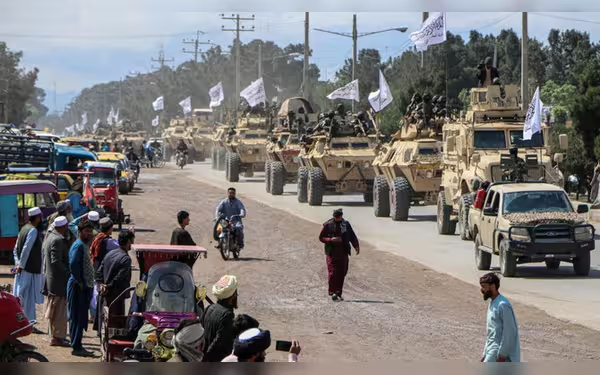Saturday, November 16, 2024 07:48 PM
Afghanistan Withdrawal: A Reflection on U.S. Foreign Policy
- U.S. withdrawal from Afghanistan raises critical questions.
- Biden's decisions faced scrutiny amid Taliban resurgence.
- Afghan people's plight remains largely unaddressed.
 Image Credits: thefrontierpost
Image Credits: thefrontierpostThe U.S. withdrawal from Afghanistan highlights failures in foreign policy and its dire impact on the Afghan people.
In August 2021, the United States faced a significant and controversial moment in its foreign policy history: the withdrawal from Afghanistan. This event marked the end of a 20-year military involvement that began in the wake of the September 11 attacks. The chaotic exit of American troops and the rapid takeover of Afghanistan by the Taliban raised numerous questions about the decisions made by U.S. leaders over the years. Recently, U.S. House Foreign Affairs Committee chair Michael McCaul, a Republican, released a report that placed the blame for this disastrous withdrawal squarely on President Joe Biden. However, this narrative is not as straightforward as it seems, as the roots of the situation can be traced back to previous administrations, particularly that of former President Donald Trump.
During his 2016 campaign, Trump promised to end what he termed "forever wars," with Afghanistan being the prime example. By the time he took office in 2017, the conflict had evolved significantly. U.S. troop levels had decreased from a peak of over 100,000 to around 18,000, and the annual cost of the war had dropped from $120 billion to approximately $18 billion. Despite this reduction, Trump remained focused on his populist message, which resonated with many Americans who were weary of prolonged military engagements.
In 2019, Trump's administration initiated direct talks with the Taliban, leading to a 2020 agreement that set a timeline for the withdrawal of U.S. forces by May 2021. This agreement was made without the involvement of the Afghan government and included the release of thousands of Taliban prisoners. When Biden took office in January 2021, only 2,500 U.S. troops remained in Afghanistan. While this number was small, they played a crucial role in stabilizing the region. However, Biden claimed that he was bound by Trump's deal, a statement that many critics argue is misleading.
Biden had the authority to reverse many of Trump's policies, and there was no legal requirement to adhere to the withdrawal timeline. Instead, he saw an opportunity to end America's involvement in Afghanistan, a mission he had long been skeptical about. In a move that many now question, he pushed the withdrawal deadline from May to September and ordered the abandonment of Bagram air base without notifying Afghan officials. This decision led to a swift collapse of the Afghan government, with the Taliban capturing provincial capitals and eventually seizing Kabul.
The aftermath of this withdrawal has been dire. Today, Afghanistan is under Taliban rule, and many are left wondering if a small contingent of U.S. troops could have prevented this outcome. The consequences of the U.S. withdrawal extend beyond Afghanistan, as America's adversaries have been emboldened by what they perceive as weakness. Russia's invasion of Ukraine and China's aggressive stance on Taiwan are just two examples of how the global landscape has shifted in the wake of the U.S. exit.
However, the most tragic impact of this situation has been on the Afghan people. Millions are now living under a repressive regime, facing economic collapse and a worsening humanitarian crisis. As American politicians engage in a blame game, the plight of the Afghan people remains largely unaddressed. The lack of accountability and clear solutions from U.S. leaders reflects a troubling state of American foreign policy.
The withdrawal from Afghanistan serves as a stark reminder of the complexities and consequences of foreign policy decisions. It highlights the importance of considering the long-term effects of such actions, not just on the geopolitical stage but also on the lives of ordinary people. As the world watches, it is crucial for leaders to learn from these experiences and strive for a more thoughtful and responsible approach to international relations.













